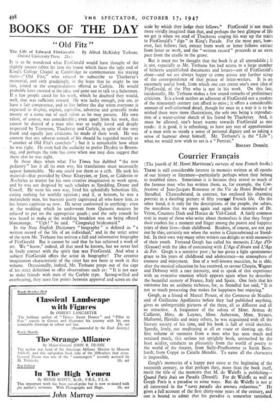BOOKS OF THE DAY
"Old Fitz
The Life of Edward FitzGerald. By Alfred McKinley Terhune. (Oxford University Press. 21s.) IT is to be wondered what FitzGerald would have thought of the slightly rococo tablet let into the house which faces the ugly end of King's College Chapel at Cambridge to commemorate his staying there—" Old Fitz," who refused to subscribe to Thackeray's memorial, and only grudgingly, in the hope that he might be too late, joined in the congratulations offered to Carlyle. He would probably have snorted at the idea, and gone out to talk to a fisherman. If a few people cared for his work, which he doubted they would, well, that was sufficient reward. He was lucky enough, you see, to have a fair competence, and to live before the day when everyone is expected to display, exploit, capitalise, advertise and generally make money or a name out of such talent as he may possess. His own talent, of course, was considerable ; even apart from his work, that cannot be denied of a man who was so really loved and deeply respected by Tennyson, Thackeray and Carlyle in spite of the very frank and equally just criticisms he made of ;heir work. He was content that any adverse remark of his should be regarded merely as "another of Old Fitz's crotchets"; but it is remarkable how often he was right. He even had the audacity to prefer Dryden to Brown- ing, and perhaps the time has come when one may dare suggest that there also he was right.
In these days when what The Times has dubbed "the new pedantry" has it all its own way, his translations must necessarily appear lamentable. No one could use them as a crib. He took his material—that provided by Omar Khayyam, or jarni, or Calderon or /V.schylus as matter for his own creative imagination to work upon, and he was not despised by such scholars as Spedding, Donne and Cowell. He went his own way, lived his splendidly bohemian life, caring nothing for worldly opinion ; and if, at bottom, he was a melancholy man, his buoyant gaiety captivated all who knew him, as his letters captivate us now. He never conformed in anything : even at the wedding which he underwent from Quixotic motives he refused to put on the appropriate gauds • and the only remark he was heard to make at the wedding breakfast was on being offered blancmange. "Ugh! " he said. "Congealed bridesmaid."
In the New English Dictionary " biography " is defined as "a Written record of the life of an individual," and in the strict sense of the term Mr. Terhune has written a ftill and informative biography of FitzGerald. But it cannot be said that he has achieved a work of art. We "know," indeed, all that need be known, but we never feel in lively contact with the spirit that was FitzGerald. And what a subject FitzGerald offers the artist in biography ! The creative imagination characteristic of the sitter has not been at work in this volume. Occasionally, indeed, Mr. Terhune peeps out of the cage of his strict definition to offer observations such as: "It is not easy to make friends with men of the Carlyle type. Strong-willed and overbearing, they have few points between approval and scorn on the
scale by which they judge their fellows." FitzGerald is' not much more vividly imagined than that and perhaps the best glimpse of life we get is when we read of Thackeray singing his way up the stairs to FitzGerald's " digs " in King's Parade. For the most part, how- ever, fact follows fact, extract from work or letter follows extract from letter or work, and the "written record" proceeds at an even pace from the cradle to the grave.
But it must not be thought that the 'book is at all unreadable ; it is not, especially as Mr. Terhune has had access to a large number of hitherto unpublished documents and letters—not of FitzGerald's alone—and we are always happy to come across any further scrap of the correspondence of that prince of letter-writers. It is an extremely useful book, from which one can create one's own idea .of FitzGerald, of the Fitz who is not in his work. On this last, incidentally, Mr. Terhune makes a few sound remarks of preliminary criticism. It is a book neither an adherent of FitzGerald nor a student of the nineteenth century can afford to miss ; it offers a considerable amount of well-informed detail, though for once in a way it is to be wished there were more illustrations, the sole one being a reproduc- tion of a water-colour sketch of his friend by Thackeray. And, it must be allowed, one's heart warms towards FitzGerald as one reads : it is good, it is refreshing, to have any sort of apprehension of a man with so steady a sense of personal dignity and so taking a sense of humour about himself. Mr. Terhtme's is the "Life " ; what, we would now wish to see is a "Portrait."
BONAMY DOBRilt


































 Previous page
Previous page